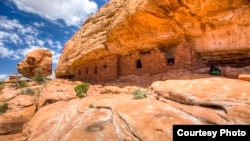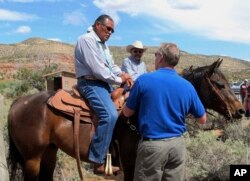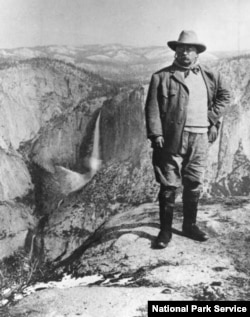Native American tribes on Monday said they will immediately file a lawsuit against U.S. President Donald Trump, who signed a executive order shrinking two national monuments on land in southern Utah which tribes consider to be sacred.
The order calls for cutting and dividing Bears Ears National Monument, currently about half a million hectares, into two units to be called Shash Jaa (Navajo for “Bears Ears”) and Indian Creek, which together will total fewer than 93,000 hectares.
The order will also modify the three-quarters-of-a-million-hectare Grand Staircase Escalante National Monument into three units, cutting the total size to just over 400,000 hectares.
The Navajo Nation, together with the Hopi, Ute Mountain Ute Tribe, Pueblo of Zuni and the Ute Indian Tribe Native Americans, say the president doesn’t have the constitutional authority to make the cuts, and they are set to challenge him in what will likely be a drawn-out a test of Trump’s legal powers.
“The 1906 Antiquities Act allows the president to establish national monuments. But it does not provide additional authority for the president to revoke or modify those designations. That’s an authority that only Congress retains,” said Ethel Branch, attorney general for the Navajo Nation, speaking by phone from Salt Lake City.
Branch noted that while she represents only the Navajo Nation, she is coordinating and will be filing the suit jointly with the other tribes.
“As an Indian Nation, one of the most important aspects of tribal authority is the ability to continue our existence as Native people into the future. That’s a big part of why we wanted Bears Ears protected as a national monument. And we intend to defend that and make sure that our people have continued access to those lands and the resources that they contain.”
In April, Trump called on the Department of the Interior (DOI) to review all national monuments larger than 4,047 hectares with an eye toward their status and use.
"The Antiquities Act does not give the federal government unlimited power to lock up millions of acres [hectares] of land and water, and it is time we ended this abusive practice," the president said, saying the order would end "another egregious abuse of federal power" and return that power to the states and to the people.
No president has yet abolished or revoked national monument status, though presidents have shrunk national monuments in the past—acts which were not challenged but which Branch said were also unconstitutional.
“The original intent of the Antiquities Act was to protect our tribal sacred sites and the cultural objects in those sites," said Jefferson Keel, president of the National Congress of American Indians, in a statement. He expressed solidarity with the tribes impacted by the order. "The history of our indigenous ancestors lives in these sacred places. Today’s action to reduce Bears Ears and Grand Staircase-Escalante endangers our freedom of religion, our histories and our communities."
Navajo Nation spiritual healer Jonah Yellowman, a member of the Bears Ears Inter-Tribal Coalition, told VOA he’s disappointed by the order.
“We tried to get the Interior Department to come down to where we live and talk to some of our elders and some of the medicine people, but they never did,” he said. "They don’t really know what it is we are trying to tell them. They don’t understand how sacred it is to us.”
The White House said Monday that Interior Secretary Ryan Zinke visited eight monuments in six states and personally held more than 60 meetings with hundreds of local stakeholders.
In a press conference streamed on Facebook after the order was issued, Branch told reporters the five tribes would be filing a lawsuit later in the day.
At the time of this writing, that suit has not yet been filed.
Yellowman, despite his disappointment, expressed confidence for the future.
“Whatever will happen, we’re still together. We still have our beliefs. We’re going to prevail.”







